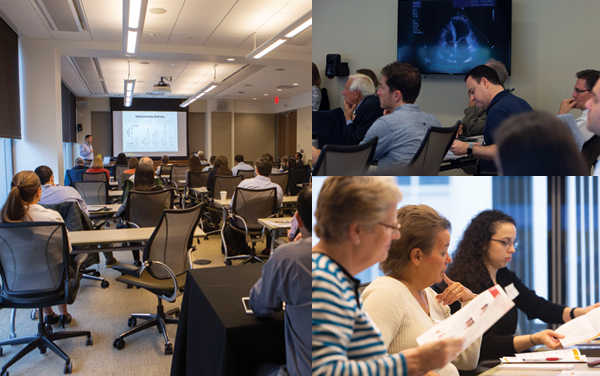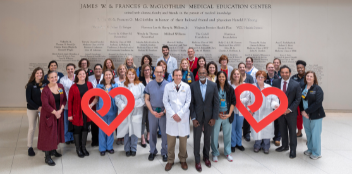Heart Failure Symposium
Pauley hosted its Heart Failure Symposium in October, which provided continuing medical education to local health care providers. This year’s theme was “Caring for Our Community,” and the symposium was held at the VCU School of Medicine’s McGlothlin Medical Education Center.

“It was a great day filled with high-impact learning,” said Dr. Keyur Shah, section chief of heart failure, who moderated the event with Dr. Richard Cooke, Moses D. Nunnally Professorship in Cardiology and medical director of heart transplantation.
The symposium provides a venue to disseminate vital information to the medical community. “Heart failure is a disease that’s not just treated at specialized centers and cardiology clinics, it’s also managed by primary care physicians, general cardiologists and others. And, the field is evolving so quickly,” said Shah. “The symposium offers an opportunity for our community partners, many of whom refer patients to us, or share patients with us, to come and visit us and learn about the updates in the field and the opportunities for their patients at VCU Health.”
Throughout the day, Pauley cardiologists and cardiac surgeons covered topics such as heart failure, cardiac transplantation, mechanical circulatory devices, pulmonary hypertension and structural heart disease. Guests learned about the latest in drug treatments and how to implement them and upcoming clinical trials involving device therapies.
The symposium provides a venue to disseminate vital information to the medical community. “Heart failure is a disease that’s not just treated at specialized centers and cardiology clinics, it’s also managed by primary care physicians, general cardiologists and others.
In the afternoon, participants rotated to three rooms for small group sessions. The breakout sessions allowed the attendees to get hands-on experience with mechanical devices and learn how to evaluate for pacemaker dysfunction in heart failure patients. They also learned about the role of MRIs in diagnosing cardiomyopathies.
“The highlights were watching how excited the attendees were working with Dr. Daniel Tang in the wet lab and Dr. Greg Hundley’s demonstration, with his hands, showing how an MRI alters electron spins. It was fun and made difficult concepts understandable,” said Cooke.
Attendance was limited. “We found that, having done this in the past, the doctors appreciate the smaller group sessions and the opportunity for more interaction with the speakers,” he said.
Pauley has hosted the event three times over the past six years. The planners hope to make the symposium an annual event in the future, due to the rapidly changing nature of the field as well as positive feedback from attendees.
“We hear a variety of things—from appreciation of the educational content to their really enjoying the opportunity to interact with the faculty whom maybe they’ve only met over the phone before,” said Shah.
“The attendees I spoke to wanted to know when the next symposium would be held,” added Cooke. “The symposium went very well. My thanks to all who participated.”
Back to Spring-2019

